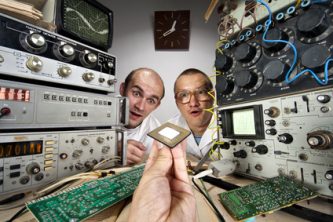Metasurface chip provides fast heart attack diagnosis
Researchers in the US have developed a chip with a metasurface that accelerates diagnosis of different kinds of conditions and infections, including a heart attack
The first use for the plasmonic metasurface chip is to diagnose heart attacks using surface enhanced Raman spectroscopy analysis (SERS). This laser-based technique can pick up sensitive biomarkers in the blood, indicating a heart attack much faster than existing techniques. It can also be used for detecting other biomarkers.
“Heart attacks require immediate medical intervention in order to improve patient outcomes, but while early diagnosis is critical, it can also be very challenging—and near impossible outside of a clinical setting,” said researcher Peng Zheng, an assistant research scientist at Johns Hopkins University. “We were able to invent a new technology that can quickly and accurately establish if someone is having a heart attack.”
- Graphene biosensor disrupts medical diagnostics
- Medical tech trends for 2024
The plasmonic metasurface uses subwavelength structures consisting of alternately stacked gold and silica atoms in a pyramid that simultaneously enhanced electric and magnetic fields to enable spatially extended and weakly wavelength-dependent SERS. The structures can be modified to detect infectious diseases and cancer biomarkers.
Finite-difference time-domain (FDTD) simulations showed the spatially extended and weakly wavelength-dependent SERS enhancement, and 3D printing created the proof-of-concept chip for multiplexed detection of a panel of serum cardiac biomarkers for acute myocardial infarction.
The frequency shift SERS multiplexing could open new opportunities to develop quantitative optical techniques for applications in chemistry, biology, and medicine.
“We’re talking about speed, we’re talking about accuracy, and we’re talking of the ability to perform measurements outside of a hospital,” said Prof Ishan Barman in the Department of Mechanical Engineering. “In the future we hope this could be made into a hand-held instrument where you have a drop of blood and then, voilà, in a few seconds you have detection.”
“There is enormous commercial potential,” he said “There’s nothing that limits this platform technology.”
The team now plans to refine the blood test and explore larger clinical trials. The proof-of-concept work on the plasmonic metasurface chip is published in Advanced Science.











